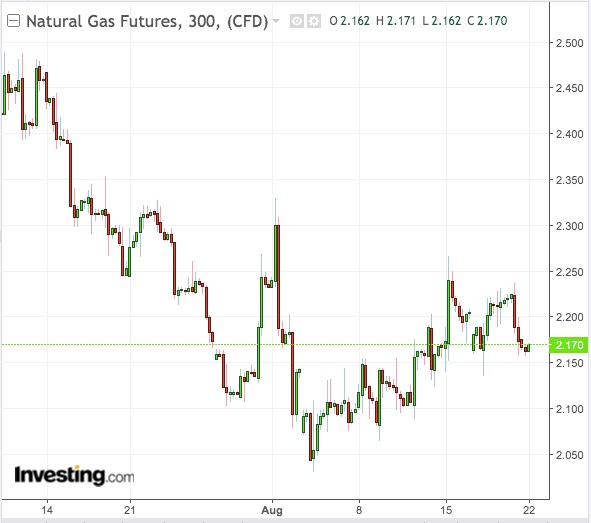More Challenges For Natural Gas Pricing As ‘Shoulder Season’ Beckons
Investing.com | Aug 22, 2019 10:40
The “shoulder season” for natural gas is looming on the market, bringing with it the woe of weak demand and pricing that could further challenge the fuel’s key $2 support.
With the end of last week’s warmth that briefly boosted air-conditioning demand, temperatures are expected to ease by this weekend in the key gas-fired power generation zone of the U.S. Northeast, as more variable weather patterns take over.
To analysts such as Dan Myers of Gelber & Associates in Houston, that could only mean one thing: a new round of price pressures as the onset of amiable conditions that require little or no cooling lead to greater storage rather than burning of gas.
Said Myers:
“Although the western U.S. continues to bake through the end of August, key population centers will get a break (from the heat) and end the latest round of near-record natural gas power demand.”
Ahead of Thursday’s weekly gas storage report due from the U.S. Energy Information Administration at 10:30 AM ET, analysts are forecasting a rounded up estimate of 60 billion cubic feet (bcf) in gas injections for the week ended Aug. 16.
At 60 bcf, the latest weekly addition to storage would be 25% higher than a year ago, considering there was an injection of just 48 bcf during the week ended Aug. 17, 2018. It would also be higher than the five-year (2015-2019) average injection of 51 bcf for the week.
Myers said he expected the “final crescendo of summer temperatures” in the Northeast and other key gas-fired power generation belts during the current week to Aug. 23.
Dominick Chirichella, director of risk and trading at the Energy Management Institute in New York, concurred with that view, saying:
“The driver remains the cool down that gets underway in the 6-to-10 day forecast and spreads across a larger geographical area in the 11 to 14 day period."
“In addition, the market is expecting an above normal injection into inventory further helping to keep any remaining bulls on the sidelines.”
At Wednesday’s settlement, the benchmark September gas contract on New York Mercantile Exchange’s Henry Hub fell 4.8 cents, or 2.2%, to $2.17 per million metric British thermal units (mmBtu).
For now, there is little immediate risk of the contract losing the key $2 per mmBtu support, with its 18-cent buffer above the $1 bracket.

But on the other hand, the dismal price action in recent days once again leaves the market poised for a week in the red, resuming a trend broadly seen since mid July. Until last week’s near 4% rally, Henry Hub’s benchmark gas futures contract lost a cumulative 14% over four weeks. In the current week, the contract is starting at a loss of 1.6%.
Investing.com’s Daily Technical Outlook has a “Neutral” call on natural gas, projecting a bottom of $2.057 and top-end resistance of $2.297.
Myers said the return of cooler-than-normal temperatures in a large swath of the United States will allow injections to climb going into the shoulder season:
“There’s potential to send the market even lower in the coming days.”
Trading in financial instruments and/or cryptocurrencies involves high risks including the risk of losing some, or all, of your investment amount, and may not be suitable for all investors. Prices of cryptocurrencies are extremely volatile and may be affected by external factors such as financial, regulatory or political events. Trading on margin increases the financial risks.
Before deciding to trade in financial instrument or cryptocurrencies you should be fully informed of the risks and costs associated with trading the financial markets, carefully consider your investment objectives, level of experience, and risk appetite, and seek professional advice where needed.
Fusion Media would like to remind you that the data contained in this website is not necessarily real-time nor accurate. The data and prices on the website are not necessarily provided by any market or exchange, but may be provided by market makers, and so prices may not be accurate and may differ from the actual price at any given market, meaning prices are indicative and not appropriate for trading purposes. Fusion Media and any provider of the data contained in this website will not accept liability for any loss or damage as a result of your trading, or your reliance on the information contained within this website.
It is prohibited to use, store, reproduce, display, modify, transmit or distribute the data contained in this website without the explicit prior written permission of Fusion Media and/or the data provider. All intellectual property rights are reserved by the providers and/or the exchange providing the data contained in this website.
Fusion Media may be compensated by the advertisers that appear on the website, based on your interaction with the advertisements or advertisers.